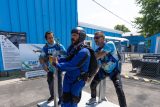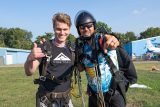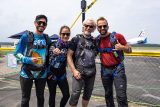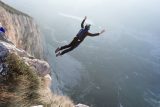Understanding Accelerated Freefall (AFF): A Comprehensive Guide for Beginners
AFF
Posted by: Start Skydiving
6 months ago
The world of skydiving may seem a bit intimidating to newcomers, especially for those who are interested in becoming a full-fledged skydiver. We understand that getting started on your skydiving journey can be a bit daunting from an outsider’s perspective. But don’t get discouraged!
The truth is that we were all once in your shoes – gazing up at the sky, watching skydivers land their parachutes, envisioning our own heart-racing adventures. Getting your skydiving license through the Accelerated Freefall (AFF) program is absolutely possible and yes, even YOU can do it! With our comprehensive guide into the realm of Accelerated Freefall, we hope to shed light on what makes it a popular choice for novice skydivers and big dreamers alike.
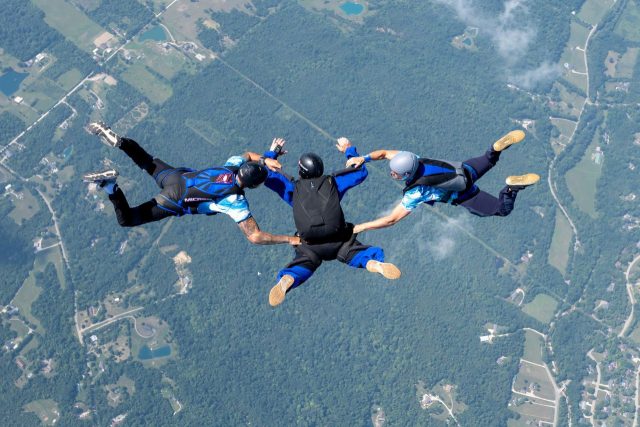
What is AFF?
Accelerated Freefall, known as AFF, is a highly-renowned training method commonly used in the sport of skydiving to help individuals achieve their skydiving license and skydive on their own. It serves as the primary pathway for beginners to develop freefall and canopy piloting skills while under the guidance of trained instructors.
While AFF is well-known within the skydiving community, it is a common misconception that everyone knows what AFF is. AFF may sound like a technical term to newcomers ears, but it is, in fact, a gateway to the incredible freedom of our sport.
Why is it Called AFF?
In the historical context of skydiving, AFF marks a significant departure from the traditional static line method used in the past. Beginner skydivers would initiate their skydiving training by jumping with a line attached to the aircraft, ensuring a gradual deployment of the parachute.
Thanks to the revolutionary change to AFF, students were granted the opportunity to experience immediate freefall right from the first solo jump. With AFF, beginner skydivers are not tethered to the aircraft by a traditional static line allowing only parachute flight. Instead, they are able to jump at full altitude with two instructors to experience the thrill of freefall, setting the stage for a more engaging and rapid learning curve – a.k.a. Accelerated Freefall.
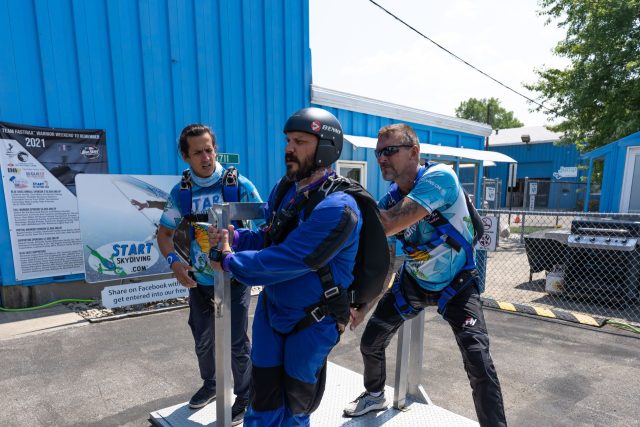
What Makes AFF So Good?
We’ll agree that nothing is perfect. And while AFF tends to be a bit more costly due to the involvement of more instructors and higher altitudes, the pros of AFF far outweigh the cons. Here are the pros of learning to skydive using the AFF program:
- Accelerated Progression: We get it. You want to learn everything you need to know to become a sick skydiver, ready for whatever – this is why AFF is the most popular way to get your skydiving license! AFF empowers students to gain essential skills quickly and efficiently, fostering a deeper understanding of the sport without getting discouraged or skipping any crucial steps.
- The Global Standard: AFF has become the standard training program within the skydiving industry all over the globe. This standardization ensures consistency in training methodologies and enhances the overall safety and effectiveness of the learning process. So get on the AFF train!
Understanding AFF’s Variability
While AFF is the global standard, dropzones are empowered to adjust the program as necessary to fit their needs. As long as the program follows the loose guidelines of the Integrated Student Program (ISP) and is approved through the United States Parachute Association (USPA), it is A-OK! Be sure to confirm that the AFF program follows this format at the least:
- First Jump Course: Also called, “Ground School”, this is where the student will make NO jumps but attend a four to eight hour classroom style course to learn everything they need to know about skydiving, from the gear and to parachute flight, to body flight positions and more.
- Assisted Freefall: Even after your thorough ground school instruction, we wouldn’t just hurl you out of a plane and say “good luck!” During your first jumps you will be accompanied by USPA-certified AFF instructors who support you while you gain real-life, hands-on experience.
- Self Supervision: The final stage of training is self supervision. Self supervision is a crucial aspect of AFF that emphasizes independence and confidence in executing jumps without direct assistance. This autonomy becomes vital as students progress through the course and begin to question what they’re supposed to do after the course has ended. By the end of the program you will have the confidence to say “I got this!” as you leave the nest!
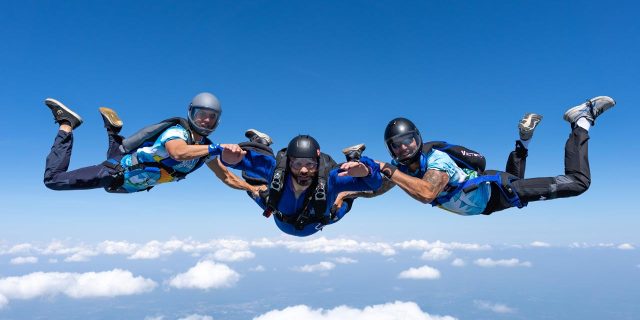
What Happens After AFF?
Once a student reaches the self-supervision stage – typically after completing seven or eight AFF jumps – the focus shifts to acquiring additional skills. These skills are necessary to meet the requirements for obtaining an A license.
The curriculum here at Start Skydiving emphasizes a structured approach to skill acquisition, ensuring a well-rounded foundation for future jumps. After the AFF jumps, you will move onto coach jumps where you will be instructed by a coach to help teach you these skills:
- Tracking
- 5,500’ Clear-and-Pull
- 3,500’ Clear-and-Pull
- Forward and Backward Movement
- Forward and Backward Movement with Docking
- Downward and Upward Movement and Fall Rate Control
- Down and Up with Forward Movement to Dock
- Diving and Swooping
At Start Skydiving we also offer continuing education opportunities to learn advanced belly-flying body positions, center-point knee-turns, and side-sliding.
Other Considerations
Here is some additional information that is important to understand about the AFF program:
- Recurrency Requirements: Staying current while navigating the AFF program involves making regular jumps and skill maintenance. According to the USPA, students going through the AFF program who have not jumped within 30 days should make at least one jump under the direct supervision of an appropriately rated USPA Instructor. If it’s been over four months since your last jump, you will be required to repeat the entire first jump course over again, starting back off at the previous category that was most recently completed (or Cat-D). Consistency is key to retaining the skills acquired during the course and getting the most out of your training program.
- Passing/Failing Levels: AFF consists of multiple levels, each with specific skill objectives. The successful completion of these objectives is what determines a pass or fail. All jumps must be passed before moving onto the next and receiving your official A license certification. Which means there is the potential to fail a jump. When this happens, you will simply need to repeat the jump until it is passed. This will be determined by your instructor/coach.
- Tandem Jumps: Some dropzones require a tandem skydive before AFF or even as a part of the AFF course. At Start Skydiving, we do not REQUIRE tandem skydives in our program, but we strongly recommend that you complete at least one tandem before enrolling in AFF. Tandem jumps provide valuable insights and acclimatize beginners to the skydiving experience before needing to focus on remembering specific skills while skydiving. It is also a great way to “try before you buy” if you’re unsure about starting AFF.
- Pricing Options: Most AFF programs give you the option to prepay for the entire program upfront in order to save some money in the long run. If you’re unable to do so or are unsure if you want to commit to the program right away, you do have the option to pay as you go.
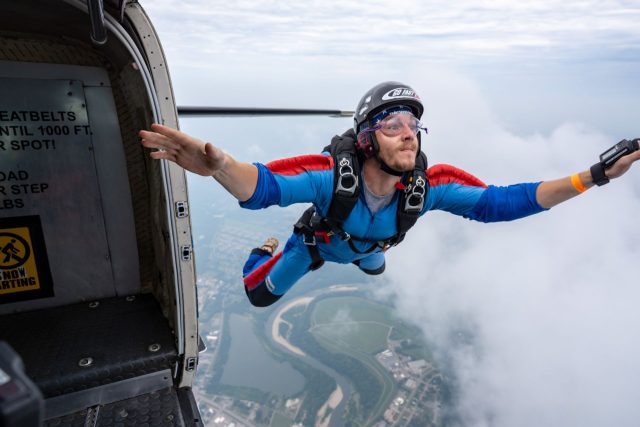
Frequently Asked Questions
Our FAQs page provides a lot of great information about the AFF program at Start Skydiving. Here are some of the questions we get most frequently:
Is there an age requirement to learn how to skydive? The minimum age to learn skydiving at Start Skydiving and any other USPA-member dropzone is 18 years old.
Is there a weight requirement for enrolling in AFF? At Start Skydiving, you must weigh less than 235 lbs.
Do I have to do a tandem skydive before beginning AFF? It depends on the dropzone, at Start Skydiving we do not require a tandem skydive, but we strongly recommend that you do complete one.
How long does it take to complete ground school? Ground school typically takes a full day (4-8 hours).
Are weather limitations different for students versus licensed skydivers? Weather restrictions are more limited for students as compared to licensed skydivers.
How much does it cost to rent gear? At Start Skydiving, all rental gear is included in the price of the AFF program.
How long does it take to complete AFF? The program can be completed in as little as two weeks but depends on your availability and commitment, and the weather. Most students take a month or more to complete the program.
What if I don’t pass a particular AFF course category? If you don’t pass a category on your first try, you simply repeat it until you do! (Repeat jumps are billed separately.)
How do I land if I’ve never jumped before? In the beginning, students will be guided on landing the parachute via radio communication from the ground by an instructor. (It helps to know what to expect if you’ve made a tandem!)
What happens after AFF? Once you complete the AFF program and a total of 25 jumps, you are eligible to apply for your USPA A License – the first of four skydiving license levels.
What are the different skydiving license levels? The USPA issues four skydiving licenses: A, B, C and D.
What can you do with each skydiving license? With each skydiving license, you earn new privileges in the sky:
- A License: jump without supervision
- B License: perform night jumps, eligible for the USPA Coach Rating after 100 jumps
- C License: Eligible for the USPA Instructor rating (not including Tandem Instructor), participate in certain demonstration jumps, jump with a camera, may ride as passenger on USPA Tandem Instructor training and rating renewal jumps.
- D License: Eligible for all USPA ratings (including Tandem Instructor).
Accelerated freefall serves as a dynamic and all-inclusive entry point into the world of skydiving. It’s immediate freefall, global standardization, and self-supervision emphasis make it an appealing choice for those seeking an accelerated learning experience.
Start Skydiving stands out as a premier destination for aspiring skydivers. We offer an invaluable amount of experience from our professional instructors and with our state-of-the-art aircraft, fantastic facilities, and commitment to safety – you’ll be glad to learn from the best of the best! Our student experience is top-notch and is bound to set the bar for a high-quality skydiving career full of memories, knowledge, and adventure.
Start skydiving with Start Skydiving – book your AFF First Jump Course today!
